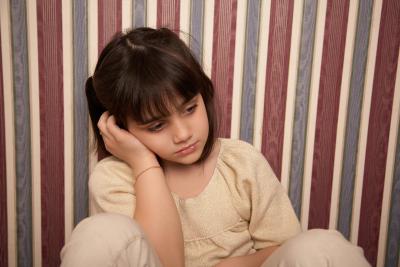While you hope that your child’s youth is full of nothing but happiness and laughter, you should know that childhood depression is a real problem that could stand in the way of this happiness. Approximately 3 percent of young children, and 9 percent of teens, will experience the effects of serious depression, reports WebMD. If you think that your child may suffering from depression, be on the lookout for its common signs.
Step 1
Consider your child’s overall demeanor. While all children go through fits of upset, if your child appears to be unhappy more than he is happy, it could be a sign that his sadness levels have risen beyond the norm and that he is falling victim to childhood depression.
Step 2
Discuss peer relationships with your child. Children who are depressed often stop socializing with friends that they once held dear. Over dinner, or during another appropriate time for conversation, ask your child about his best friends. If he seems dismissive or uninterested, or expresses no desire to spend time with these once constant companions, he may be suffering from depression.
Step 3
Monitor your child’s sleeping habits. Children who are depressed spend more time sleeping and are more eager to go to bed than their peers.
Step 4
Compare your child’s current weight to his weight several months ago. While your child’s weight will likely change as he grows and develops, this change should be gradual. If your child suddenly exhibits a noticeable, and unexplainable, loss or gain of weight, he may be suffering from depression.
Step 5
Think back on the past several months, considering whether your child has complained of feeling ill more frequently. As WebMD reports, children who are depressed often complain of headache, stomachache or other seemingly simple maladies more frequently than non-depressed children.
Step 6
Seek the opinion of a medical professional. If you believe that you have seen the earmarks of depression in your child, don’t keep your concerns to yourself. Instead, visit a professional and seek an official diagnosis. Only a medical professional can truly determine if the signs you see are really those of depression.





